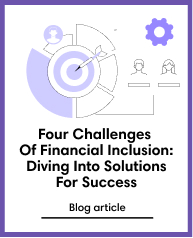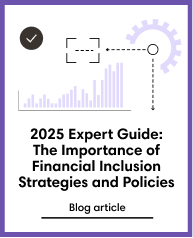Financial Inclusion
Jan 5, 2022
How fintech collaboration can fasten economic recovery in Indonesia
Subscribe to our newsletter
Over the past few years, Indonesia has become a fertile ground for financial technology innovation, especially when it comes to payments, cards, and lending. The mass and rapid adoption of fintech in the country comes as no surprise given that it is home to approximately 191 million internet users, which is expected to grow to about 240 million by 2025. Moreover, the Indonesian government has been proactive in enabling peer-to-peer lending, digital payments, and open banking to encourage innovation and improve financial inclusion.
As of October, there are now 322 registered and licensed fintech companies in Indonesia, with 125 online lenders awaiting their licences to operate. The continuous growth of the fintech sector has led the Indonesia Fintech Association, Bank Indonesia (BI), and other local fintech organisations to inaugurate Nov. 11 as National Fintech Day and kickstart the National Fintech Month (BFN), which is expected to end on Dec. 12. The month-long program aims to promote digital finance literacy and awareness of legal fintech, as well as open job opportunities for people with the potential to further drive the sector’s progress forward.
Because of fintech’s direct relevance in the lives of millions of Indonesians, Minister of Communication and Information Johnny Plate believes that the fintech sector will be a driver of digital economic growth in Indonesia. But this begs the question: What will be the driver of the fintech sector? The quick answer to that is collaboration.
The power of collaboration
Even prior to the COVD-19 pandemic, industry leaders and regulatory bodies believe that collaboration is the key to promoting financial inclusion in the country, which is crucial as 66% of its population remains unbanked.
As the central bank of Indonesia, BI acts as the main driver of fintech collaboration in the country. Back in 2019, it launched its Quick Response Indonesia Standard (QRIS) code system as a universal way of enabling cashless payments in Indonesia. BI developed the system in collaboration with banks, financial institutions, interbank network providers, and fintech company LinkAja.
Not only does the QRIS help Indonesians seamlessly pay for goods and services now, but it also allows the government to save on costs that they would have otherwise spent on chip cards and RFID tags. The low-cost deployment of QRIS also benefits end customers, especially the 65 million micro, small and medium enterprises that empower the Indonesian economy. QRIS encourages these MSMEs to adopt the cashless payment system despite not being able to afford card reader machines.
Private fintech companies have also jumped into the collaboration wagon in the hopes of further growing the fintech sector and serving more consumers. Just early this year, mobile tech giant Gojek invested in LinkAja to meet new digital consumption habits as an economic result of the pandemic. The two fintech companies also aim to strengthen the adoption of digital financial services and accelerate financial inclusion in Indonesia.
Collaboration in lending
Outside payments, the Indonesian government is also expanding fintech innovation in lending. Past research from PricewaterhouseCoopers indicated that providing equal access to financial services such as credit can boost Indonesia’s economic growth. However, Indonesia has had a very low loan disbursement per GDP compared to other countries.
Without access to credit, it would become more difficult for individuals to achieve their financial goals and for small businesses to grow their revenue. This should be taken as a sign of alarm as individuals within the lower and middle expenditure per capita segment and MSMEs make up a majority of the Indonesian population, giving them significant roles within the country’s economy. Fortunately, collaboration has also become key to widening access to credit in Indonesia.
Credolab became a big contributor in Indonesia’s fintech space in 2020 when Indonesia’s Financial Services Authority (OJK) recognised the company as a provider of digital financial technology. Credolab’s fintech credit scoring solutions allows players in the peer-to-peer industry to use alternative data such as digital footprints to better assess credit or loan applicants and improve their credit risk management practises. Credit risk management has become more important than ever during the pandemic as the economic effects of the crises can cause some borrowers to default on their debts.
OJK sees credolab as a prototype of the credit scoring cluster of financial services in the country. With direct support from the Indonesian government, the company stands a chance at empowering fintech lending in the country and opening more opportunities for millions of unbanked Indonesians to access credit.
Indonesia is ultimately on the right track in the fintech revolution. With the Indonesian government and big fintech players embracing collaboration and innovation, unbanked Indonesians may soon be able to enter the formal financial system faster than we realise. As Indonesia also attempts to recover from the effects of the pandemic, enabling economic activity through fintech will now be more important than ever.





